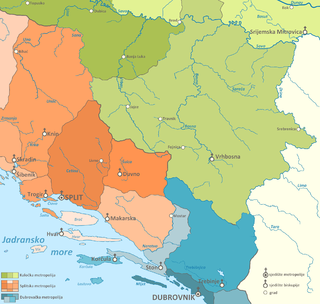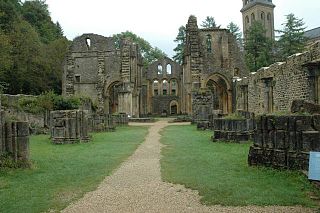Related Research Articles
Pavao Posilović was a Bosnian-Herzegovinian and Croatian prelate of the Catholic Church who served as the bishop of Duvno from 1655 to his death in 1658. Previously, he served as the bishop of Skradin from 1642 to 1655 and from 1644, he was entrusted with the pastoral care of the Catholics in several dioceses under the Ottoman rule.

The Diocese of Duvno was a Latin rite particular church of the Catholic Church that was established in the 14th century with a seat in present-day Tomislavgrad in Bosnia and Herzegovina. It was a suffragan diocese of the Archdiocese of Split, and during the 17th century of the Archdiocese of Dubrovnik. The diocese consisted of four parishes: Roško Polje, Duvno, Posušje and Rama.
Daniel Vocatius, sometimes Vocensis, Vocacensis or Vocacio was a Croat prelate of the Catholic Church who served as the bishop of Duvno from 1551 to 1575 and the bishop of Muro Lucano from 1575 to his death in 1577.
Marijan Lišnjić was a Croatian and Bosnian-Herzegovinian prelate of the Catholic Church who served as the bishop of Makarska from 1664 and apostolic administrator of Duvno from 1667 to his death in 1686. Both of his dioceses were under the Ottoman occupation, and the population suffered from both the war between the Republic of Venice and the Ottomans and the treatment from both, with Venetians enslaving and selling Christians to the Turks, and Ottomans oppressing their faith.

John of Hoio was an abbot of the Cistercian Orval Abbey in present-day Belgium and Triumfontium in Luxembourg who, according to Konrad Eubel, served as the assistant bishop of Trier, simultaneously holding the title of a titular bishop of Duvno in present-day Bosnia and Herzegovina. Dominik Mandić, while researching the history of the Diocese of Duvno, could not find any documents on him, thus being unable to determine whether John of Hoio ever served as the residential bishop in Duvno. At the end of his life, John returned to the Orval Abbey, where he is buried.
Madius was a prelate of the Catholic Church who served as the bishop of Duvno from between 1298 and 1311 to his resignation in 1344. Konrad Eubel considers him a second bishop of Duvno, while Dominik Mandić left the question open whether Madius was indeed the second or the first bishop of Duvno, as he couldn't find any document confirming his alleged predecessor John of Hoio as the bishop of Duvno. During his episcopate, he was involved in long-lasting litigations against the archbishops of Split as a representative of Bishop Valentin of Makarska over the control of Omiš and other church objects. Madius resigned due to what he calls "maliciousness of the people", which might refer to the opposition of his faithful to pay taxes and the political plight which befell him after his patrons from the Šubić family lost the political influence after the conquest of their domains by Stephen II, Ban of Bosnia. He nevertheless retained the title of a bishop and, according to Ante Škegro, lived on the territory of the Archdiocese of Split.
Stephen was a prelate of the Catholic Church who served as the bishop of Duvno from 1355 to 1362 and again in 1371. Stephen also administered the Diocese of Makarska after its bishop Valentine resigned in 1344 until his return to the Diocese in 1356.
Juraj Imoćanin was a prelate of the Catholic Church who served as the bishop of Duvno from 1392 to 1412, the bishop of Hvar from 1412 to 1420 and from 1420 to 1428 and the bishop of Skradin from 1420 to 1423. After his transfer from the Diocese of Duvno, he continued to administer the diocese until he died in 1428.
Jeronim Trogiranin was a prelate of the Catholic Church who served as the bishop of Duvno from 1439 to his resignation in 1459.
Nikola Zadranin was a prelate of the Catholic Church who served as the bishop of Duvno from 1460. The date of the end of his episcopate remains unknown.
Vid Hvaranin was a prelate of the Catholic Church who served as the bishop of Duvno from 1489 to 1507.
Tomás de Córdoba was a Spanish prelate of the Catholic Church who was a titular bishop of Duvno from 1507 to 1514.
Álvaro Salas Sánchez was a Spanish prelate of the Catholic Church who serve as a titular bishop of Duvno from 1514 to his death in 1520.
Andrés Clemente de Torrecremata was a Spanish prelate of the Catholic Church who served as a titular bishop of Duvno from 1521. The date of the end of his episcopate and death is unknown.
Nicolaus Bogantius was a Hungarian prelate of the Catholic Church who served as an auxiliary bishop in the Diocese of Transylvania and a titular bishop of Duvno from 1536 to his death in 1551. He spent most of his tenure in Rome as a representative of John Zápolya, the contested king of Hungary and an Ottoman subject.

Alfons de Requesens y Fenollet was a Spanish prelate of the Catholic Church who served as the bishop of Barbastro from 1627 to 1639. Holding a titular title of the bishop of Duvno from 1610 to 1627, de Requesens served as an auxiliary bishop of Olomouc from 1610 to 1621 and Toledo from 1621 to 1627. Before his service in Toledo, de Requesens held several duties in Franciscan provinces in Germany and Austria and also served as a diplomat for Emperor Ferdinand II.
Bartul Kačić was a Croatian prelate of the Catholic Church who served as the bishop of Makarska from 1615 to his death in 1645, at the same time, he administered the Diocese of Duvno.
Marijan Maravić was a Bosnian-Herzegovinian prelate of the Catholic Church who served as the bishop of Bosnia from 1647 to his death in 1660. He previously served as the bishop of Duvno from 1645 to his appointment to the Diocese of Bosnia in 1647 but continued to administer the diocese until 1655.
Petar Tilikonis was a Croatian prelate of the Catholic Church who served as the bishop of Makarska from 1394 and administrator of Duvno from 1429 to his death in 1439.
Stjepan Blašković was a Croatian and Bosnian-Herzegovinian prelate of the Catholic Church who served as the bishop of Makarska from 1732 to his death in 1776. While being a bishop of Makarska, Blašković also administered the dioceses of Duvno under the Ottoman occupation.
References
Books
- Mandić, Dominik (1936). Duvanjska biskupija od XIV.–XVII. stoljeća[The Diocese of Duvno from 14th to 17th century] (in Croatian). Zagreb: Tisak nadbiskupske tiskare.
- Škegro, Ante (2002). Na rubu opstanka: Duvanjska biskupija od utemeljenja do uključenja u Bosanski apostolski vikarijat[On the verge of existence: the Diocese of Duvno from its foundation till inclusion in the Vicarate of Bosnia] (in Croatian). Zagreb: Dom i svijet. ISBN 9536491850.